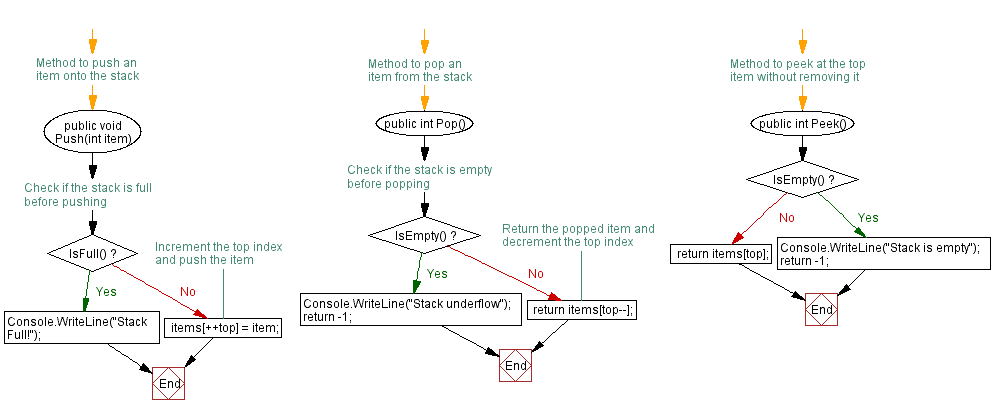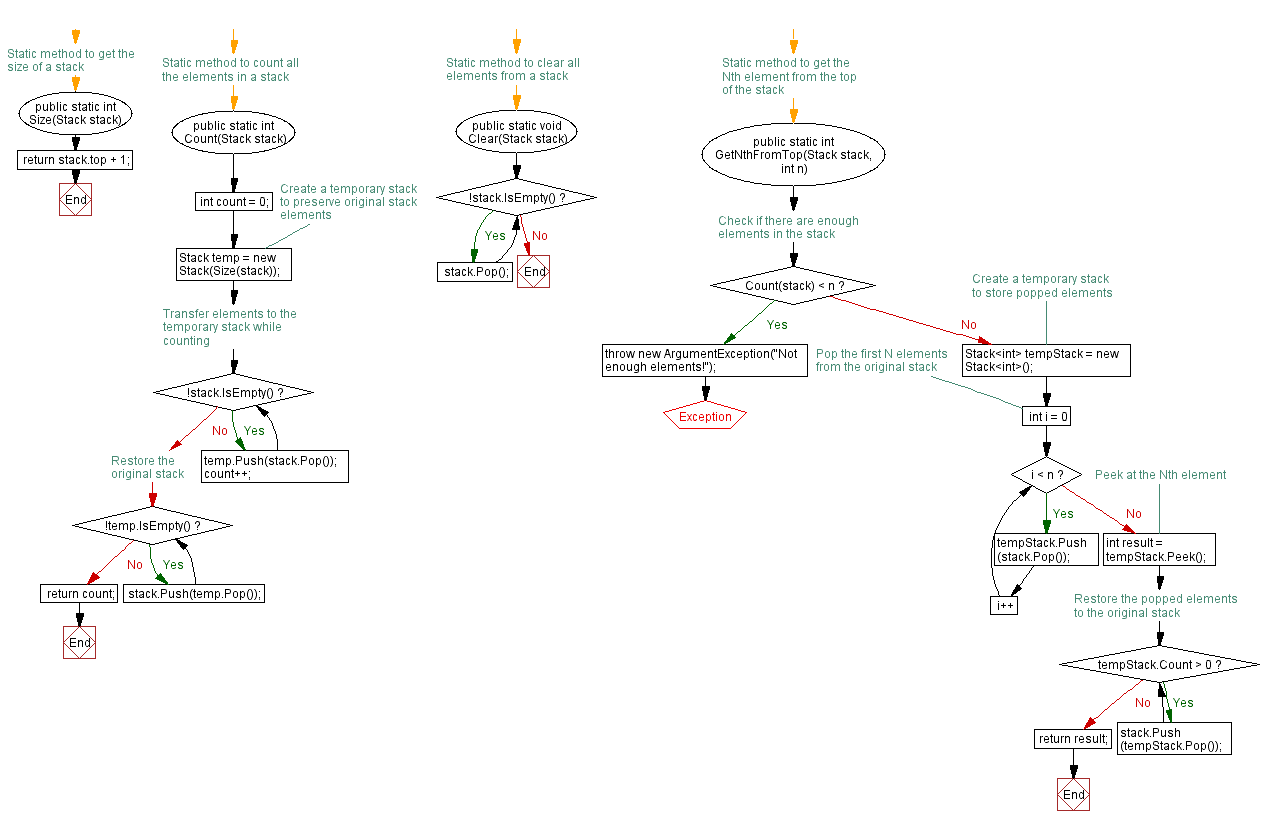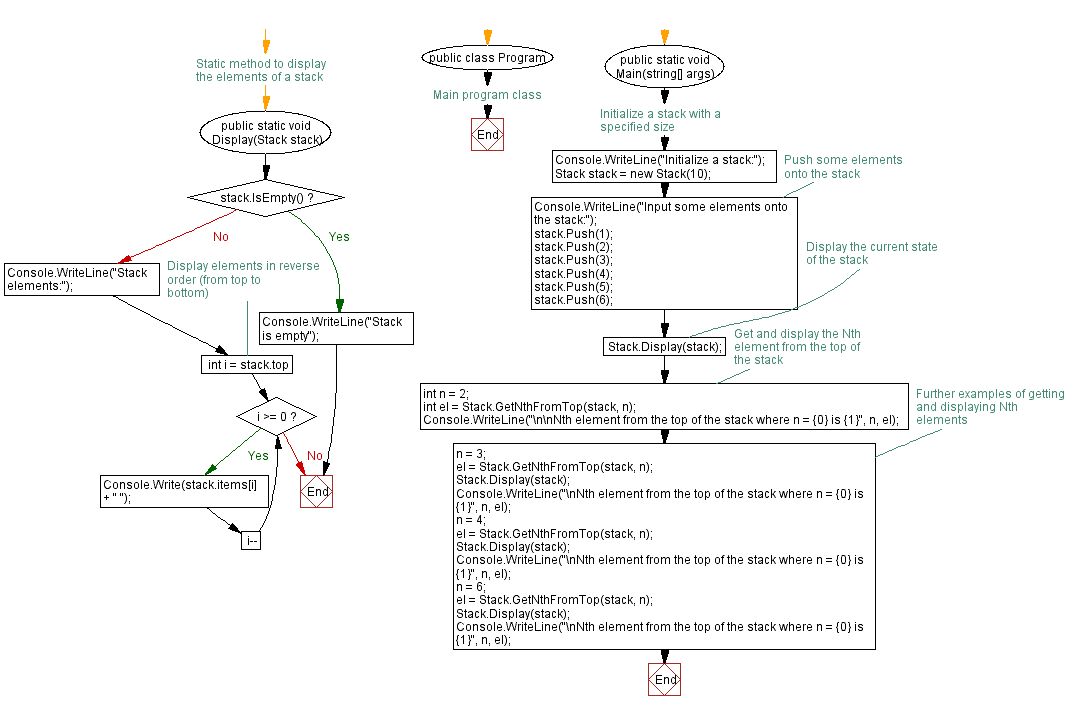C#: Nth element from the top of the stack
Write a C# program to get the nth element from the top of the stack.
Sample Solution:
C# Code:
// Using directives for necessary namespaces
using System;
using System.Collections;
using System.Collections.Generic;
// Definition of the Stack class
public class Stack
{
// Private fields for stack implementation
private int[] items;
private int top;
// Constructor to initialize the stack with a specified size
public Stack(int size)
{
items = new int[size];
top = -1;
}
// Method to check if the stack is empty
public bool IsEmpty()
{
return top == -1;
}
// Method to check if the stack is full
public bool IsFull()
{
return top == items.Length - 1;
}
// Method to push an item onto the stack
public void Push(int item)
{
// Check if the stack is full before pushing
if (IsFull())
{
Console.WriteLine("Stack Full!");
return;
}
// Increment the top index and push the item
items[++top] = item;
}
// Method to pop an item from the stack
public int Pop()
{
// Check if the stack is empty before popping
if (IsEmpty())
{
Console.WriteLine("Stack underflow");
return -1;
}
// Return the popped item and decrement the top index
return items[top--];
}
// Method to peek at the top item without removing it
public int Peek()
{
if (IsEmpty())
{
Console.WriteLine("Stack is empty");
return -1;
}
return items[top];
}
// Static method to get the size of a stack
public static int Size(Stack stack)
{
return stack.top + 1;
}
// Static method to count all the elements in a stack
public static int Count(Stack stack)
{
int count = 0;
// Create a temporary stack to preserve original stack elements
Stack temp = new Stack(Size(stack));
// Transfer elements to the temporary stack while counting
while (!stack.IsEmpty())
{
temp.Push(stack.Pop());
count++;
}
// Restore the original stack
while (!temp.IsEmpty())
{
stack.Push(temp.Pop());
}
return count;
}
// Static method to clear all elements from a stack
public static void Clear(Stack stack)
{
while (!stack.IsEmpty())
{
stack.Pop();
}
}
// Static method to get the Nth element from the top of the stack
public static int GetNthFromTop(Stack stack, int n)
{
// Check if there are enough elements in the stack
if (Count(stack) < n)
{
throw new ArgumentException("Not enough elements!");
}
// Create a temporary stack to store popped elements
Stack<int> tempStack = new Stack<int>();
// Pop the first N elements from the original stack
for (int i = 0; i < n; i++)
{
tempStack.Push(stack.Pop());
}
// Peek at the Nth element
int result = tempStack.Peek();
// Restore the popped elements to the original stack
while (tempStack.Count > 0)
{
stack.Push(tempStack.Pop());
}
return result;
}
// Static method to display the elements of a stack
public static void Display(Stack stack)
{
if (stack.IsEmpty())
{
Console.WriteLine("Stack is empty");
return;
}
Console.WriteLine("Stack elements:");
// Display elements in reverse order (from top to bottom)
for (int i = stack.top; i >= 0; i--)
{
Console.Write(stack.items[i] + " ");
}
}
}
// Main program class
public class Program
{
public static void Main(string[] args)
{
// Initialize a stack with a specified size
Console.WriteLine("Initialize a stack:");
Stack stack = new Stack(10);
// Push some elements onto the stack
Console.WriteLine("Input some elements onto the stack:");
stack.Push(1);
stack.Push(2);
stack.Push(3);
stack.Push(4);
stack.Push(5);
stack.Push(6);
// Display the current state of the stack
Stack.Display(stack);
// Get and display the Nth element from the top of the stack
int n = 2;
int el = Stack.GetNthFromTop(stack, n);
Console.WriteLine("\n\nNth element from the top of the stack where n = {0} is {1}", n, el);
// Further examples of getting and displaying Nth elements
n = 3;
el = Stack.GetNthFromTop(stack, n);
Stack.Display(stack);
Console.WriteLine("\nNth element from the top of the stack where n = {0} is {1}", n, el);
n = 4;
el = Stack.GetNthFromTop(stack, n);
Stack.Display(stack);
Console.WriteLine("\nNth element from the top of the stack where n = {0} is {1}", n, el);
n = 6;
el = Stack.GetNthFromTop(stack, n);
Stack.Display(stack);
Console.WriteLine("\nNth element from the top of the stack where n = {0} is {1}", n, el);
}
}
Sample Output:
Initialize a stack: Input some elements onto the stack: Stack elements: 6 5 4 3 2 1 Nth element from the top of the stack where n = 2 is 5 Stack elements: 6 5 4 3 2 1 Nth element from the top of the stack where n = 3 is 4 Stack elements: 6 5 4 3 2 1 Nth element from the top of the stack where n = 4 is 3 Stack elements: 6 5 4 3 2 1 Nth element from the top of the stack where n = 6 is 1
Flowchart:




Go to:
PREV : Swap the top two elements of a stack.
NEXT :
Merge two stacks into one.
C# Sharp Code Editor:
Improve this sample solution and post your code through Disqus
What is the difficulty level of this exercise?
Test your Programming skills with w3resource's quiz.
